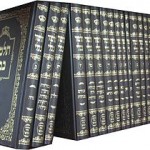Boils & proselytes – Ask the Rabbi
Q. Is it true that the Talmud says that converts are like boils? Isn’t that an insult?
 A. The saying is in Yevamot 47b. Possibly it reflects the negative view in an ancient rabbinic cleavage of opinion about proselytes.
A. The saying is in Yevamot 47b. Possibly it reflects the negative view in an ancient rabbinic cleavage of opinion about proselytes.
The positive view is found in Chapter 12 of Avot D’Rabbi Natan and many other sources which praise those who bring gentiles “under the wings of the Divine Presence”.
The Midrash (Num. R. 10:1) says that the Holy One, blessed be He, waits for the nations to come under His wings. The Midrash Tanchuma says (Lech L’cha 32a), “Dearer to God is the proselyte who has come of his own accord than all the crowds of Israelites who stood at Mount Sinai”.
These positive views reflect the messianic doctrines of the prophets Isaiah (Chapter 2) and Micah (Chapter 4) who speak of all the nations coming to the Mountain of the House of the Lord in order to hear and obey His Word.
The passage you allude to is a play on words based on Isa. 14:1 which says that “the stranger shall join himself – v’nisp’chu – with them (the people of Israel) and cleave to the House of Jacob”. From v’nisp’chu a link is constructed with sapachat, a skin disease.
This analogy greatly bothered the interpreters. Several main lines of exegesis developed:
• The proselytes often observe Jewish law better than born Jews, for whom they are a source of irritation.
• A sapachat can be harmful but it can also be healing and beneficial.
• Sometimes a proselyte creates problems by lapsing and going back to his/her previous ways.
• Sometimes a “convert” does not genuinely want Judaism but has an ulterior motive.
• The proselyte lacks Jewish lineage, which may be a problem in some circles.
To illustrate the fourth explanation, let me recall that I know of cases where people tried to become part of the Jewish community in order to attempt missionary work from within. Not only would this have been a problem for Judaism but it was ethically, spiritually and intellectually dishonest.
There is an analysis in George Foot Moore’s 3-volume book on Judaism, vol.1, p. 342, in which he addresses the time frame of the Talmudic statement and says amongst other things, “In the persecution under Hadrian (proselytes) were under strong temptation to clear their own skirts by turning informers”.
Nonetheless there is a overwhelmingly positive attitude in halachah, summed up in the Talmudic Encyclopedia, where the article on gerut (conversion) begins unambiguously: “It is an obligation for a Beth Din to accept a gentile who comes to be converted, and to convert him according to Jewish law”.



